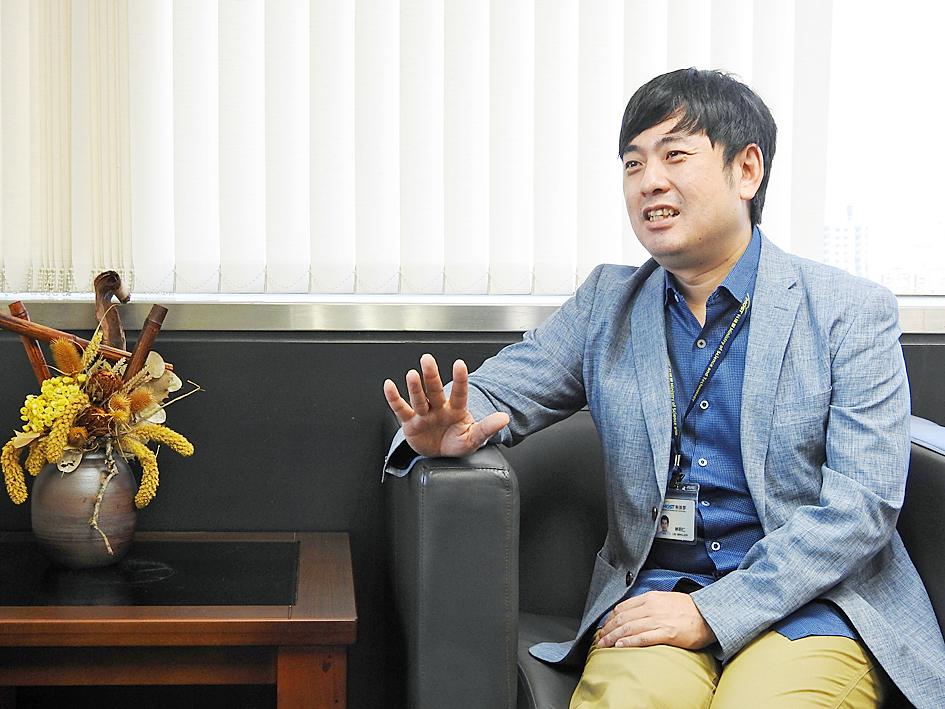A study coauthored by Taiwanese economist Lin Ming-jen (林明仁) that examines long-term care needs and women in the workplace has won this year’s APEC Healthy Women, Healthy Economies Research Prize.
The winner was announced during a virtual Women and the Economy Forum on Friday last week.
The study, titled “How Much Do Long-Term Care Needs Affect Female Labor Supply?”, has yet to be formally published, Lin told the Taipei Times by telephone yesterday.

Photo courtesy of the Ministry of Science and Technology
The researchers used regression analysis and event study methods to analyze government data from 2008 to 2019 on taxes, labor insurance, disability insurance and foreign caregiver applications, he said.
Married daughters are 15 percent less likely to participate in the labor market than married sons when parents have long-term care needs, Lin said.
Daughters, not sons, are typically the major caregivers for sick or aging parents, he said, adding that this is the perpetuation of a common stereotype in Asian countries, where men are thought to be superior to women.
To care for a sick parent, many women leave the workplace or choose a less challenging job, and they usually have difficulty returning to the workplace, even after the parent dies and their caregiving responsibilities are finished, Lin said.
Men and women aged 25 to 30 have similar workforce participation rates, but the gap widens after age 30, the research showed.
The study was commissioned in late 2019 by the Executive Yuan’s Department of Gender Equality, Lin said, expressing the hope that it would lead to an evidence-based evaluation of labor policy in Taiwan.
In January last year, Lin left his post as a professor in National Taiwan University’s Department of Economics to begin a three-year term as director-general of the Ministry of Science and Technology’s Department of Humanities and Social Sciences.
The study’s other authors were Lin’s students. Chen Kuan-ming (陳冠銘) is a post-doctoral fellow at the US’ National Bureau of Economic Research and Hsiang Chen-wei (項振緯) is a doctoral student at University College London.
“Unpaid care work, which disproportionately falls on women’s shoulders, is vital for societies to function,” Renee Graham, chair of APEC’s Policy Partnership on Women and the Economy, said in the news release announcing the winning study yesterday.
“If we are to build back better and build back more inclusively, we must find ways to support the women who perform the majority of this labor — often without recognition or full appreciation for the important work they are doing,” she said.
The research prize winner was awarded US$20,000, while the two runners-up — from China and Singapore — received US$5,000 each, APEC said.

A decision to describe a Chinese Ministry of Foreign Affairs statement on Singapore’s Taiwan policy as “erroneous” was made because the city-state has its own “one China policy” and has not followed Beijing’s “one China principle,” Deputy Minister of Foreign Affairs Tien Chung-kwang (田中光) said yesterday. It has been a longstanding practice for the People’s Republic of China (PRC) to speak on other countries’ behalf concerning Taiwan, Tien said. The latest example was a statement issued by the PRC after a meeting between Singaporean Prime Minister Lawrence Wong (黃循財) and Chinese President Xi Jinping (習近平) on the sidelines of the APEC summit

Taiwan’s passport ranked 34th in the world, with access to 141 visa-free destinations, according to the latest update to the Henley Passport Index released today. The index put together by Henley & Partners ranks 199 passports globally based on the number of destinations holders can access without a visa out of 227, and is updated monthly. The 141 visa-free destinations for Taiwanese passport holders are a slight decrease from last year, when holders had access to 145 destinations. Botswana and Columbia are among the countries that have recently ended visa-free status for Taiwanese after “bowing to pressure from the Chinese government,” the Ministry

‘SIGN OF DANGER’: Beijing has never directly named Taiwanese leaders before, so China is saying that its actions are aimed at the DPP, a foundation official said National Security Bureau (NSB) Director-General Tsai Ming-yen (蔡明彥) yesterday accused Beijing of spreading propaganda, saying that Chinese President Xi Jinping (習近平) had singled out President William Lai (賴清德) in his meeting with US President Joe Biden when talking about those whose “true nature” seek Taiwanese independence. The Biden-Xi meeting took place on the sidelines of the APEC summit in Peru on Saturday. “If the US cares about maintaining peace across the Taiwan Strait, it is crucial that it sees clearly the true nature of Lai and the ruling Democratic Progressive Party (DPP) in seeking Taiwanese independence, handles the Taiwan question with extra

HEALTHCARE: Following a 2022 Constitutional Court ruling, Taiwanese traveling overseas for six months would no longer be able to suspend their insurance Measures allowing people to suspend National Health Insurance (NHI) services if they plan to leave the country for six months would be abolished starting Dec. 23, NHIA Director-General Shih Chung-liang (石崇良) said yesterday. The decision followed the Constitutional Court’s ruling in 2022 that the regulation was unconstitutional and that it would invalidate the regulation automatically unless the NHIA amended it to conform with the Constitution. The agency would amend the regulations to remove the articles and sections that allow the suspension of NHI services, and also introduce provisional clauses for those who suspended their NHI services before Dec. 23, Shih said. According to